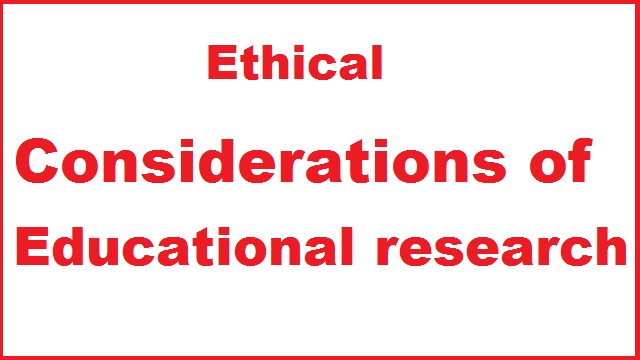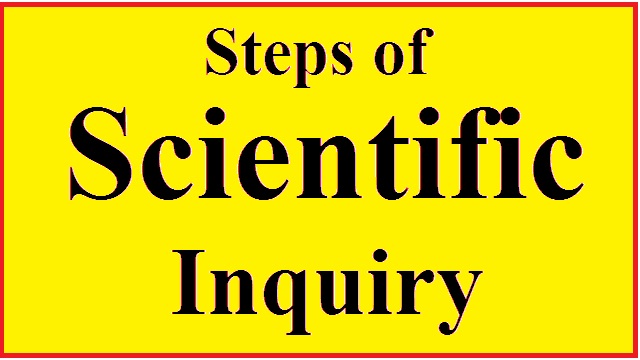Ethical Considerations of Educational research
Ethical Considerations of Educational research
Introduction
• The term ethics is derived from the Greek word ethos, meaning custom or convention.
• Moral principles that govern a person’s behaviour or the conducting of an activity - Oxford Dictionary (2014)
• The branch of philosophy that dealswith morality. Ethics is concerned with distinguishing between goodand evil in the world, between right and wrong human actions, and between virtuous and non virtuouscharacteristics of people – The American Dictionary of Cultural Literacy (2005)
Four basic tenants
• Honesty – Conveying information truthfully and honoring commitments.
• Accuracy – Reporting findings precisely and taking care to avoid errors.
• Efficiency – Using resources wisely and avoiding waste.
• Objectivity – Letting the fact speak for themselves and avoiding improper bias.
Main Stakeholders in Research Ethics
• The researcher
• The subject/participant
• Funding organization
• The university
• Regulatory bodies
• Publishers
• Society as a whole
Ethical Principles/ guidelines for educational Research
Research Ethics should have some principles or guidelines or elements which is also known as the Belmont Report (1979) as Belmont was the 1stperson who initiated with the principles of Research Ethics. Those principles are discussed here:
1. Principle of respect for human dignity- Prior approval of participants is necessary while collecting data about participants.The participants should be treated as autonomous agentsso that they control their own activities. The researcher should make the person aware of the nature of the study, its responsibility and they have also the right to refuse participation.
2. There should be no discrimination or biason the part of researcher against any individual on the basis of caste, class, sex, race, religion etc.
3. Research ethics should also include the protection of human and animal subjects.
4. Transparency and Accountprocedure- Data, results, methods and procedure should be maintained and interpreted honestlyby the researcher.
5. Openness in sharing data, results, ideas, tools and resources would make the study open for criticism and this would result in the creation of new ideas.
6. Researcher should maintainobjectivity so that it avoids bias in research design, data analysis and peer-review etc.
7. The researcher should be carefulwhile doing research and avoid any mistakes or negligence.
8. Confidentiality is maintained- While conducting research the Researcher should maintain confidentiality about participants data, a personal record and privacy issues as the participants might not want to disclose its identity to the public( annonemity).
Things to avoid
• Falsification
• In this, data is manipulated by researcher and researcher shows results which are not accurate.
• This is done by the researcher to prove his/her point in research by manipulating the data. This is ethically wrong.
Fabrication
• In this, the researcher adds data which does not exist in reality and is used by the researcher in studies.
• Creation of spurious data by a researcher, their recording, and drawing inference is wrong.
• Plagiarism
In this, the researcher uses other people while claiming it to be their own.
It is the act of appropriating somebody’s else’s ideas, thoughts, pictures, theories, words as your own.
Researcher work ethics becomes questionable in this.
It is an illegal and punishable act.
Copying your own work from one research to another also amounts plagiarism. Therefore, to avoid this reference should be made.
There are many websites and software available to check plagiarism.
√ grammarly.com
√ paperrater.com
√ plagiarism.net
√ urkund.com
√ Turnitin.com
• The issue with funds, incentives or gifts
The researcher should not lure any participant by offering gift or incentives for providing data.
Small gifts as a token of appreciation could be given.
Funds allocated to research should not be used for any other purpose, and fake bills should not be submitted for claiming money.
• Other import aspects of ethical research
• Ethics has to be observed in every stage of the research process like:
• When the researcher collects information.
• While seeking the consent of Participants.
• While seeking confidential information and providing incentives to Participants.
• Even after conducting research, the researcher should make sure that no harm is done to participant like in medical testing, invasion pf privacy, harassment and dehumanizing procedure.
• References:
• Net guide book of KVS Madan
• researchgate.net
• scielo.ora.za
• Net guide book of Uddalak




Comments
Post a Comment